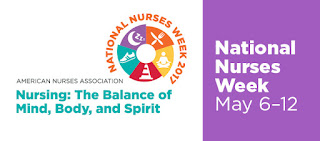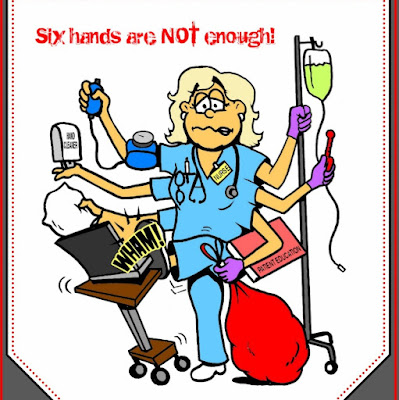PREGNANCY HEALTH TIPS | KNIGHTMODE NURSE LIFESTYLE
Coping With Pregnancy As A Nurse
We are familiar with most basic pregnancy advice like: do not smoke, avoid alcohol, get enough rest, exercise etc but staying healthy during pregnancy as a nurse isn't as easy as one may think. |
| Being pregnant can be confusing, especially if it's your first! |
You have patients to take care of and most times neglect your basic health needs. Well, these are just reminders on what you should do.
Get Essential Nutrients
It is important to get essential nutrients like folic acid, calcium, and iron, from the very start! It helps in the development of the baby especially within the first month of pregnancy. You can get them as OTC drugs or prescribed by your doctor.
Exercise
It is important to stay active during pregnancy as it can help you reduce stress, control your weight, improve circulation, boost your mood, and sleep better. If you can, take a pregnancy exercise class or go for a walk at least 20 minutes daily. You can also do some yoga. Meanwhile, do not over do your activities! Listen to your body!
Make A Birth/Delivery List/Plan
Most of us do not do this but this is very helpful
- List items you will be needing at the hospital (from baby clothes to toiletries you may need). Some hospitals may give you a list of what you they may want you to bring.
- Who you want present, including children or siblings of the baby
- Procedures you want to avoid or prefer. Do you want an SVD or a CS?
- What positions you prefer for labor and delivery
- Special clothing you'd like to wear
- Whether you want music or a special focal point
- What to do if complications arise
Educate Yourself
Read, attend ANC, ask questions. Even if you are a multi-para, attending ANC will help you feel prepared and allay anxieties you may be having. Remember no two pregnancies are the same!
Practice Kegels
Kegel exercises strengthen the pelvic floor muscles, which support your bladder, bowels, and uterus. Done correctly, this simple exercise can help make your delivery easier and prevent problems later with incontinence. The best part: No one can tell you're doing them, so you can practice kegels in the car, while you're sitting at your desk, or even standing in line at the grocery store. Here's how to do them right:
- Practice squeezing as though you're stopping the flow of urine when you use the bathroom
- Hold for three seconds, then relax for three
- Repeat 10 times
Change Your Activities At Home and At Work
Even everyday tasks like scrubbing the bathroom or bending too low can become risky when pregnant! Avoid lifting heavy objects, or coming in contact with bacteria that can harm you or your baby.
Activities to avoid:
- Heavy lifting
- Climbing on step-stools or ladders
- Bending too low to empty that urine bag from the patient's bed
- Using harsh chemicals
- Standing for long periods of time, especially near a hot stove
- Standing for too long during procedures in the hospital
Track Your Weight Gain
We know—you're eating for two. But gaining on too many extra pounds may make them hard to lose later. At the same time, not gaining enough weight can put the baby at risk for a low-weight birth, a major cause of developmental problems. Recently the Institute of Medicine (IOM) issued new guidelines for weight gain during pregnancy. Here's what the IOM recommends, based on a woman's BMI (body mass index) before becoming pregnant with one baby:
- Underweight: Gain 12.7 - 18.1 kg
- Normal weight: Gain 11.3 - 15.9 kg
- Overweight: Gain 6.8 - 11.3 kg
- Obese: Gain 4.99 - 9.1 kg
Eat More Fish
In a 2007 study of more than 12,000 children, researchers found that youngsters whose moms ate the most fish during pregnancy had higher I.Q.s, plus better motor and communication skills, than those whose mothers did not eat fish. Scientists say that's because fish is high in omega 3s, a nutrient critical to brain development. There's just one catch: Some kinds of fish contain mercury, which can be toxic to both babies and adults.
To be safe, the FDA recommends that pregnant women eat no more than 12 ounces of fish per week. Stick with canned light tuna, shrimp, salmon, pollack, or catfish. Avoid swordfish, shark, king mackerel, and tilefish, which are all high in mercury. (Healthable)
Air Travel?
Go ahead! book that flight, but take some precautions. The Mayo Clinic say mid-pregnancy (14 to 28 weeks) is usually the best time to fly—by this time you're probably over morning sickness, and the risk of miscarriage or early delivery is low. Still, check with your doctor about any travel plans, and make sure the airline has no restrictions for pregnant women. On the plane, drink plenty of water to stay hydrated, and get up and walk around every half hour to reduce the risk of blood clots. An aisle seat will give you more room and make trips to the bathroom easier.
Being pregnant can be confusing, especially if it's your first time. But as nurses we should not ignore signs and symptoms that we may want to classify as "minor".
Talk to your colleagues or doctor whenever you get any of these:
- Pain of any kind
- Strong cramps
- Contractions at 20-minute intervals
- Vaginal bleeding or leaking of fluid
- Dizziness or fainting
- Shortness of breath
- Heart palpitations
- Constant nausea and vomiting
- Trouble walking, edema (swelling of joints)
- Decreased activity by the baby
Do Not Forget
- Get at least eight hours of sleep a night,
- Take naps during the day
- Relax with friends
- Work easy





No comments:
Comments for this blog are held for moderation before they are published to the blog.
Note: Only a member of this blog may post a comment.